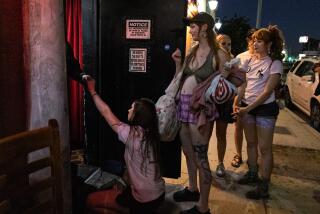TAXI DANCERS
- Share via
Writer Martin Booe justifies the existence of taxi dance clubs (“Taxi Dancers,” July 15) by waxing eloquent about the “fragility of the male ego.” But what we’re really talking about here is exploitation. The taxi-dance clubs exploit women too desperate or too stupid to find more gainful employment as well as men who feel they are too unattractive, too alien or too married to seek real relationships.
It’s astounding, but Booe also allows, “It may be that a tip of sufficient size can mitigate the offense” of the “grabbers”--his coy term for men who like to attach themselves, unbidden, to the dancer’s body parts. That kind of attack is more properly termed “assault.” Throughout the piece, Booe turns one sexist, stereotypical phrase after another; for example, “Girls . . . gabbling like women in a small-town beauty parlor.”
There’s nothing romantic or nostalgic about taxi dance clubs. They’re just more sad monuments to the power struggle between the sexes that prevents both sides from cultivating relationships based on mutual respect and trust.
NATALIE NICHOLS
North Hollywood
More to Read
The biggest entertainment stories
Get our big stories about Hollywood, film, television, music, arts, culture and more right in your inbox as soon as they publish.
You may occasionally receive promotional content from the Los Angeles Times.










